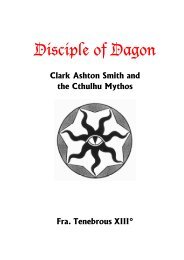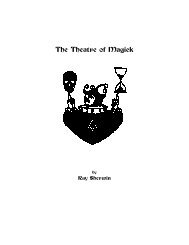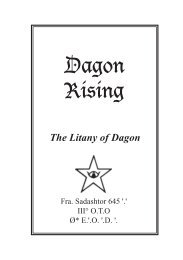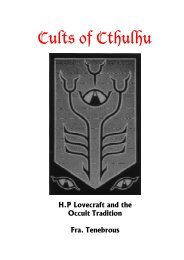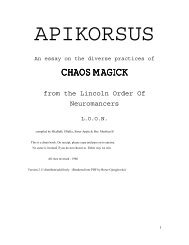Imposed PDF - Phil Hine
Imposed PDF - Phil Hine
Imposed PDF - Phil Hine
Create successful ePaper yourself
Turn your PDF publications into a flip-book with our unique Google optimized e-Paper software.
PERMUT TI NSPHIL HINE
Acknowledgements:Kathy Arden, Jo the Crow, Paul McAndrew, Gordon the Toad,Ian Read, the Z-list, Doug Grant, Tzimon Yliaster and IOTUSA.FURTHER READINGPrime Chaos by <strong>Phil</strong> <strong>Hine</strong> (Chaos International 1993), availabledirect from the publisher at BM Sorcery, London WC1N 3XXat $20 inclusive of postage (send cash, I.M.O or cheque drawnon U.K. bank made payable to “Chaos International”.)Condensed Chaos by <strong>Phil</strong> <strong>Hine</strong> (New Falcon Publications,1995)The Pseudonomicon by <strong>Phil</strong> <strong>Hine</strong> (2nd Edn) available fromDagon Productions, PO Box 17995, Irvine, CA 92713, USA.ON-LINEPERMUTATIONSby <strong>Phil</strong> <strong>Hine</strong> 1997contact: phhine@vossnet.co.ukor BM Grasshopper, LondonWC1N 3XX, UKCondensed Chaos version 1.2 - somewhat different from thefull-length book version, can be found at TOOLS OF CHAOSin Adobe <strong>PDF</strong> format. http://www.crl.com/~tzimonSee also CHAOS MATRIX for a selection of essays on variousaspects of magick.http://www.sonic.net/fenwick/
emaps the neural pathways - Mutation. The deconstruction ofIdentity from the beleaguered To To rewind back to the questionof an overall goal for Chaos Magick. I would suggest that thegoal is present, yet hidden. Chaos Magick is a process ofMUTATION. Cumulative Gnosis remaps the neural pathways- Mutation. The deconstruction of Identity from the beleagueredEgo into the legion Selves requiring only Self-Love - Mutation.The search for the most effective and adaptive WORKtechniques so that reality becomes effectively, a playground -Mutation. The seeding of culture with novel ideas, styles,fashions; the replacement of Truth with the Permission to do(Do what Thou wilt?) - Mutation. Aah, but mutation into what?Well, that’s another story.CONTENTSFOREWORD ................................................................51 THE MAGIC OF NEED ..............................................72 GODS..................................................................173 SODOMY AS SPIRITUAL FULFILMENT ......................254 STIRRING THE CAULDRON OF CHAOS .....................31FURTHER READING...................................................39ON-LINE .................................................................39
<strong>Phil</strong> <strong>Hine</strong>of PLAY, success might well be easy, but ‘failure’ is certainlyno harder.I would posit further that the experience of PLAY leads usinto new magical realms. That is, actually, they’re probablyquite old ones, it’s just that one has yet painted them black andarranged them around a Chaosphere. Here we encounter themysteries of our own internal cycles of change; cycles whichhave been buried away from the flames of perception; habits ofthought and emotional response - demons, if you like, whichhave so far crept quietly along in the cellars of selves-dom.Here we might choose to focus attention on those ‘hidden gods’which around much of our interpersonal experience is based -Love, Fidelity, Possession, Curiosity - the undefinable wordsare suddenly eased into sharp relief and looked at from newangles. Yes, the PLAY state may be used for enchantment andthe like, but only fleetingly, as, in intense states of PLAY, theattachment to any particular desire is likely to be at best, fleeting.If such magick is done, it is done from a condition of DO EASY(vide Burroughs).One of the best applications of the PLAY state I have foundso far is the Creative connection and analysis of ideas. Anythingfrom various WORK practices (magical or otherwise) to lessdefinable areas of experience - Desire, Cognitive habits,language. The relationship is a simple one: enough WORKbuilds up momentum for PLAY. PLAY jumps us into a statewhere we can radically modify our experience of WORK. Yetthe background WORK helps us to understand the dynamicsof PLAY, and opens up new areas for exploration.To rewind back to the question of an overall goal for ChaosMagick. I would suggest that the goal is present, yet hidden.Chaos Magick is a process of MUTATION. Cumulative Gnosis37
PerMutationsbe perceived as some great, universal Truth. Also, it is necessarythat the experiences one has are re-integrated and assimilatedsuccessfully when, as is inevitably the case, one returns to amore ‘stable’ sense of reality. Gravity hugs the free-flyingpsychonaut back into the well of Paramount Reality. At least,to a working approximation of such, as the magicianprogressively becomes something other than human. This iswhere previous WORK experience becomes important. Theideational contents of the Mystical flight are useless unless theyrelate to the magicians’ extant mind-set. If the experience doesnot result in the ability to go beyond previously held beliefsand concepts, and produce something new, then its validity isquestionable. So Gnostically-induced experiences of PLAYenable the magician to WORK more effectively. By the sametoken, we need to have done a certain amount of WORK toexplore the possible value of PLAY. Further, a wider definitionof Gnosis is that it is knowledge or insight which impells youto act from that point. A revelation perhaps, but one thatsignificantly changes your world-view. The encounter withPasupati discussed in the ‘Gods’ essay could be read as aninstance of Gnosis - an event which caused a significant shift inmy perspective, and also impelled me to act from that newbaseline.Playing With ChaosThe Chaos approach to Magick has reversed the general viewthat magical abilities are merely the by-products of the Mysticalquest. The emphasis is placed instead on WORK, inmanipulating MAYA. In some ways, the idea of Mysticism’send-goal, as one of overcoming or transcending MAYA is awestern misperception of a process which upholds the statement“Nothing is True, Everything is Permitted.” From the experienceFOREWORDPermutations is a collection of four essays which I feel throwsup different perspectives - a ‘window’ if you like - into thediverse forces & feelings which have shaped my approach tomagical work and concepts. Readers will discern a strongautobiographical element within these pages. This is a deliberatestyle, as I have found that the act of unveiling how magic hasaffected me personally, is a key to communicating the oftenabstract ideas which relate to the ‘hidden’ faces of magic -which are often difficult to carry across in bite-sized chunks.Simply saying “this is how such-and-such should be done” andleaving it at that - is not an approach which works for me. Themagical power of ‘concealment’ is well-known. The power ofrevealing oneself, warts ‘n’ all, is less well-attested.These four essays reflect different areas of my magical workwhich I have found, for various reasons, to be at times,problematic. Writing is for me, both an earthing and anexorcism. This collection is not quite ‘practical’ in the sameway that my other books are, but nonetheless, I feel that thereader may find some useful points herein, which cross allboundaries of magical activity.<strong>Phil</strong> <strong>Hine</strong>, February, 1997.36
<strong>Phil</strong> <strong>Hine</strong>These are two distinct, but not dichotomous experiences ofthe world. You can either WORK to make things happen, orPLAY and let things happen. But alas, it’s not that simple. Inpractising Magick as WORK, we prepare ourselves for PLAY.And the key factor which links both WORK and PLAY isGnosis.Each time you attempt to phenomenize desire, requires aburst of Gnosis-consciousness. Gnosis can last for a split second,or propel you into a state (sometimes described by, yes, Mysticsas Samadhi) of altered perception which can go on for days,weeks, or even months. The effects of Gnosis are cumulative.Gain enough momentum and Gnosis begins to affect you invarious ways: illuminations, waking dreams, hallucinations,voices, clairvoyant vision, the awakening of Siddhis which noone has taught you; which did not come from a book, yet arethere at your fingertips. There is more; heightened perceptionof self, of connections between disparate experiences andconcepts, new gestalts. The surface content of these alteredstates is not as significant perhaps, as what is going on in theCentral Nervous System. Peaks of Gnosis rewrite the neuralpaths, taking the mind’s software up to a new version, gearedfor high-speed processing. Whilst the magician remains, to alarge extent, centred in WORK mode, then this process remainsas a hidden agenda. Indeed, it seems that you have to put agreat deal of WORK in before you can get to grips with thepotential of PLAY.So here, I am arguing that Magical WORK prepares youfor Mystical PLAY. The difference can be understood in termsof manipulating MAYA to be one thing or another, as opposedto enjoying the dance in all its forms.The problem with Mysticism is that the result of cognitionwhilst within a highly-accelerated state of consciousness can35
PerMutationsThe first scene reflects the general approach to sex-magickin Western Culture. WORK: doing something to get something.The second scene is closer to a Tantric view of sex: relaxed,sensuous, pleasure-centred - PLAY.We have to work at Magick. Doing training programmes,learning the symbols & languages, learning new skills, analyzing,refining, enchanting - it’s all work. This is all very necessary, aswe have to learn to WORK before we can learn to PLAY, atleast, as far as this subject requires. Here, WORK and PLAYare experiences of the World, each complementing each other.Again, another simple example. Again, sex. Chattingsomeone up, relating to a Significant Other, Copping Off -whatever you want to call it. One way to achieve this desire isthrough WORK - which in this case might be practising chatuplines into a mirror, or perhaps, invoking Jontrav-Olta as thepatron loa of smooth-talking sex-machines, in order to projectthe appropriate glamour in order to pull. This is WORK, and Ihope that all readers are at least familiar (if only in theory) withthis kind of situation. The PLAY mode here is on one levelsimple, yet on another, complex in the extreme. Here, youmerely make brief eye contact with someone else, and suddenlyyou Know with absolute certainty, that somewhere in thisunfolding event, two paths will converge and end up in thesame bed together. What is marvellous about this experience,as I expect most readers will know, is that when that flood ofcertainty dashes itself through your mind, you are so confidentabout what is going to follow that initial moment, that you nolonger have to WORK in order to make something happen.You can afford to PLAY. And a person who is playing is free ofattachment to the fulfilment of desire, and may thus take morerisks than a person who walks in terror of losing his cool andlooking stupid.341THE MAGIC OF NEEDThere is a difference, albeit a subtle one, between ‘doing magic’as part of a development programme or to test an idea, a ritual,and the magic which arises out of need - that which wells forthfrom circumstance. Over the years, I have seen a vast differencein terms of both the event, and the effects. This is not to saythat the one is somehow ‘better’ than the other. Constructedrites based on a raw idea can spin the celebrants off in surprisingdirections. However, for the moment, I want to concentrateon the magic of need.Need may be your own inner drive, or it may arise fromcircumstances around you. What is important, I feel, is that theneed ‘fires you up’ - it engages you both emotionally andintellectually, so that you ‘have’ to do something about it. Magicis often the final recourse to action when all other roads areclosed off or have proved to be dead ends. When crisis beckons,one often doesn’t have time to sit down and plan thoroughly anice, neat ritual. Acting quickly, while the moment is hot, ismore important.The Sausage CurseSome years ago, I learnt a powerful lesson in the sorcery ofneed by watching an adept of the art at work. I was visiting the
PerMutationsHigh Priestess of a local witch coven. Whilst idly glancingthrough the evening paper, she came across a report of a rapistprowling in the district. She shot up out of the chair, shut upeveryone else in the room with an icy glance, and, on reachingthe dining table, cleared a space on it by simply sweepingeverything onto the floor with a mighty crash. She placed anindenti-kit picture of the rapist from the paper in the centre ofthe table, grabbed a sausage from the fridge, and, after furiouslyrummaging in her sewing box, proceeded to methodically driveneedles into the sausage, muttering furiously under her breath.The atmosphere in the room was electric. After some minutes,she stalked out of the room and took the sausage into the backgarden. On her return, she smiled brightly at the cowering menin the room, and announced “I think a cup of tea would benice, don’t you?” She offered no explanation or justificationfor her actions, and never alluded to it afterwards. A weeklater, the rapist was caught, sentenced and incarcerated.It was only years later that I began to appreciate the powerof this woman. She didn’t dither around, nor did she worryabout the ethics, morality, or whether or not she had the ‘right’to act in this way. Nor did she bother with any of the elaborateprocedures of ritual magic. By her glance, and her violentclearing of the table, she created a charged atmosphere thatrivalled anything I had experienced in more formal magicalsurroundings.This is the sort of thing that I am attempting to discuss. It’sdifficult, I find, to do this in the abstract, so this discourse will,of necessity, be punctuated by anecdotes.Not only is the magic which arises from need practicallyuseful (in terms of resolution) it is a highly valuable experiencefor many other reasons. Firstly, doing the magic of need showsyou just what you are capable of when necessity looms before8<strong>Phil</strong> <strong>Hine</strong>Gnosis can also be read as ‘Knowledge of the Heart’ -knowledge that is difficult to express immediately in words; agestalt projection which might take years to filter down throughlayers of connectivity before it surfaces into words on a screen.The magical universe is, of necessity, a finite space. Gnosismay well propel us, momentarily, beyond its confines. And asWilliam Burroughs has it, you cannot take words into space.Gnosis, as the term is generally applied in Chaos Magick, ismerely the visible tip of a vast range of numinous experienceswhich have, apart from a few intrepid researchers inPyschonautics (Seigel, Grof et a), been viewed as the domainof mystics. While it is arguable that Mystical practices can leadto all kinds of word-viruses (such as religion), it is also worthconsidering that merely regarding Gnosis as that which isentered briefly, in order to phenomenize a desire, is anunderestimation of the wider potentialities of this experience.Work And PlayI will offer a simple distinction between Magick and Mysticism.Magick is about WORK, whilst Mysticism is PLAY. These arenot ‘opposite’ states, but complementary experiences. Howso? Let us take an example of two acts of Sexual Magick. Inthe first case, we see a couple fiercely shagging, minds ablazewith a sigil, sweaty bodies humping towards that almightyrelease - orgasm - where sigilized desire is hurled into the void.Second case, a couple spend hours rolling around each other,lazily tasting, stroking, joking even, with no particular urgencyto orgasm, the question of whether or not orgasms will happenat all, being not particularly important. Which do you think isthe more magical of the two scenes?33
PerMutationsmight choose to uphold.It could be argued that, having dumped the concept of anoverall future, we are free to dream and design any number ofpossible futures? Hence the Pandemonaeon, a Chaos future,which to a large extent, has already happened; the problembeing of course, that we lack the required cognitive systems tomake the best adaptation to it. This idea in itself, throws thewhole issue of a ‘direction’ for Chaos Magick into sharperrelief; the ways in which we can cast forth future projectionsare couched in terms of present knowledge, present viewpoints,and the patterns through we structure information.In attempting to disentangle contemporary magick from thetrappings of religiosity or transcendentalism, advocates of theChaos Current have taken up a pretty hard-line stand on thesubject of Mysticism. They’re having none of it, basically. So,while it is permissable to applaud Crowley’s practical magick,a hard-line ‘Carrollian’ chaoist is likely to deplore his mysticalwriting.GnosisThat peculiar experience of consciousness known as Gnosis isthe key to all practical sorceries and magicks. A good deal ofmagical practice revolves around developing the ability to enterGnosis, and perhaps, in some cases, to recognise Gnosis. Gnosisis generally understood to be the ‘peak’ moment of any tranceinducingexercise whereon desire may be successfullyphenomenized (i.e. ‘no-mind’) But, I ask, is Gnosis merely thatwhich is attained after half an hour’s whirling, chanting, orwanking over a sigil? All that dancing around just for that onebrief, momentary lapse into else-where?32<strong>Phil</strong> <strong>Hine</strong>you. Necessity is also very useful in forcing back your personalboundaries - both in terms of what you think you know, whatyou can do, and, perhaps equally important - what magic cando.A Night VisitationMy early years of magical practice were much influenced by apsychological understanding of what magic was all about.Studying for a psychology degree and exploring the symbolismof the qabalah in a very intellectual way was my starting point.One of my first ‘real’ magical experiences did a lot to blowaway - in one instant - some of the boundaries I had built up inmy head concerning magical work. I had been meditating onthe Tattvic square of Earth. One night I awoke to a sense ofoverwhelming oppression. The room was filled with a red mist.It felt like someone had dumped a suitcase full of rocks on thebed. I couldn’t move. I was terrified. Didn’t know what washappening or what to do. Nothing ‘ordinary’ seemed to work.Eventually, I visualized the banishing pentagram of earth,pushing it forcefully into the space above me. It wasn’t hard tovisualize with eyes closed, ‘cos I certainly didn’t want to openmy eyes! But the banishing pentagram worked. All thesensations - pressure, oppression, etc., lifted, and I sank into agrateful sleep.This experience left me in a state of shock for a couple ofdays. What I feel is important here, is not so much that ithappened, but it showed me all too clearly that magic has ahabit of surprising you, just when you think you’ve got it‘sorted’. I’d been thinking about magic only in terms ofpsychology. Suddenly I had an experience which I couldn’t fitinto my categories of ‘explanation’ - it ‘moved the goalposts’of what I thought magic was about.9
PerMutationsIn consequence, this and other experiences have led me toconsider how the workings of magic are put across in books.Unless one is fortunate enough to make the acquaintance ofother magicians (it took me five years to meet other‘experienced’ magicians) at an early stage in one’s development,most of us have to learn from books. Therein hangs the problem.There is only so much you can put across in a book. Many ofthe magical ‘beginner’s’ books are little more than ‘cookbooks’of spells, or texts heavily influenced by modern psychology.Some authors seem to be keen to give the impression that magicis easy, and that if you follow their prescriptions ‘correctly’you shouldn’t have any untoward experiences. I have found,however, that ‘untoward experiences’ are an essential featureof magical development. I have certainly learnt more aboutmagic (& life in general) during those periods when things havebecome seriously weird!This is surely no news to the experienced magician - what Iam trying to do here is get at that ‘hidden face’ of magic, someof the weird shit that goes down, which doesn’t tend to getwritten up for books and articles.Another point about the magic of need is that it forces youto think on your feet. In such moments, I find, you really get togrips between what you think you know, and what you actuallydo know. Again, this is something that the ‘how to’ bookscan’t really prepare you for. Also, a great many magical booksare ‘dated’ when it comes to the needs of this latter end of thetwentieth century. In the Lesser Key of Solomon, for instance,there are demons who specialize in divining the fate of kings,which is all very well, but you won’t find any demons whoseprovenance relates to debugging a COBOL program or findinglost contact lenses. The myriad books on healing throughcrystals are unlikely to be of much help when your partner4STIRRING THE CAULDRON OF CHAOSChaos Culture lacks an overall vision of progression into ashared future. Civilised progress is running out of steam, whilstpluralism & divergence twist the contemporary landscape intoa fractal surface seething with new possibilities. Fragments ofpasts & present rearranged by the blind hands of the new gods- fashion, style, entertainment; plundering the past to supportan immediate now. This is the dizzying dance of MAYA.Everything is Permitted because Nothing is True. Think aboutthat for a moment.No Direction HomeCritics of Chaos Magick have pointed out that Chaos Magickdoes not have any stated goal to strive for. Unlike other magicalphilosophies, which are spun around ‘New Aeons’, futuredreams, or still cling to crypto-transcendentalist structures,Chaos does not have, at least on the surface, any overall goal.Other magical philosophies have a discernable goal; be it‘spiritual’ progression or a more humanistic ideal to which tospur the individual on. There remains just the constantsharpening of technique & ability, the recreation andrecuperation of new paradigms, the ‘empirical’ testing of newideas, and whatever hidden agenda each practitioner of Chaos10
<strong>Phil</strong> <strong>Hine</strong>celebration of pleasure rather than the denial of the body. Givingmy prick to another man is pleasurable too of course, but of adifferent order, and my reflections on this will have to wait foranother time.* Originally published in Chaos International #11.starts to recover buried memories of sexual abuse by a relative.It’s all too easy to get into a mindset where one(unconsciously perhaps) makes a division between one’smagical activity, and one’s day-to-day life. We might thinknothing of invoking a god for ‘magical inspiration’, but mightnever consider invoking a god for help in sorting out the bankoverdraft. Equally, it’s all too common for people to turn totheir tarot cards or runes to help sort out a dilemma, when the‘real world answers’ are staring them in the face. Related tothis latter is the issue of how seriously we are prepared to takethe results of divinations. It’s very common for people to ignorea divination message that they don’t want to hear, in the sameway that we might ignore ‘good advice’ from a well-meaningfriend.One of the problems of working from necessity is that it canbecome addictive - particularly if you take a great deal of interestin the problems of those around you. Some alternative healersI have met seem to be ‘addicted’ to healing in a similar fashion.Placing too much emphasis on working on behalf of otherpeople can leave you ignoring your own problems. Moreover,the ego-identification of ‘being able to sort other people out’can result in a blindness to the subtleties of a situation. As Iremarked in Condensed Chaos (New Falcon Publications,1995), over-confidence in a situation can be as problematic aslack of confidence. A case in point is that of a person I knewslightly once approached me to help him with a ‘magical battle’against a ‘black magician’ who had lured his girlfriend awayfrom him using ‘dark forces’. Oh how some occultists do lovethe melodramatic! Now, had I taken him at his word, I wouldhave simply fired up a search-and-destroy servitor and sent itoff. Being somewhat more prudent by this time, I looked intothe matter for myself and discovered another angle on the story11
PerMutations that the lady in question had grown sick of this ‘WhiteMagician’s’ pompous posturing, and quit him for another, whowas more charming, & less concerned with saving the universeand crossing the abyss before breakfast. Naturally though, theWhite Magician’s ego couldn’t accept anything so ‘normal’and commonplace, so the whole thing became a magical battlebetween Good and Evil.If you are going to intervene in someone else’s situation, Icannot stress too highly the prudent approach and theimportance of (a) gathering information - through tarot,familiars to the social grapevine, and (b), checking out yourown motivation for getting involved in the first place. What’simportant here - is it helping out a close friend, boosting yourimage as the local mage (nothing wrong with this, providingyou’re aware of it), testing out a new magical technique, orwhat? Situational analysis techniques (again discussed in theNew Falcon edn of Condensed Chaos) can be helpful here.One of the most subtle issues relating to interventions onthe behalf of others is that of ethics. In the early days of Chaosmagic’s arrival on the UK magical scene, there was muchworrying done in print by magicians of other persuasions aboutthe perceived ‘lack of ethics’ implied in the statement “Nothingis true, Everything is permitted.” The implied criticism wasthat ‘chaos magicians’ would become immoral monsters capableof just about anything, without some stated code of magicalethics to follow. For me, a cornerstone of magical work is thatone’s sense of ethics grows from within. Questions of ethicsare always going to be more complex than the often trite ‘codesof practice’ that the various pagan and magical denominationstrot out from time to time. Especially insidious is the way thatmagicians can ‘bend their ethics’ to cover behaviour whichotherwise, would not be acceptable. A rather ludicrous example12<strong>Phil</strong> <strong>Hine</strong>are just as possible in a homosexual partnership as aheterosexual one. Anal intercourse is a very effective way ofstimulating the muladhara chakra, despite what some sex-magicmanuals might say. Personally, I would say that my sexualexperiences with other men that have given rise to theexperiences described in Tantric Magick have been all the morepowerful due to the obvious element of catharsis - being ableto actualise desires which have long been repressed is generallya powerful source of energy, which can be magically directed,of course.Modern (post-Crowley) works on sexual magick seem totreat homosexuality in one of two ways. There is either theadmonition that it is wrong - it blocks your chakras, ‘reverses’the kundalini or ‘creates a dark astral vortex’, or the morepositive view that the gender of partners doesn’t matter, andthat the ‘energy’ is the same. Obviously I prefer the latterposition, though I feel that things are just not that simple. Thewriters that cleave to this latter view tend to stress that sexualmagick only works properly within an established relationship,which is true to a point, but neatly excludes all the facets ofGay sexual culture which straight society finds so disturbing -anonymous sex; S&M, and group sex particularly. In the UKat least, there seem to be few individuals or groups who areattempting to write intelligently (or more importantly, feelingly)about the possibilities of Gay-positive Tantra, and the only groupwhich provides support and magical approaches specificallytailored for gay men is the international Voudou Network.Hopefully, as the issue of spirituality raises its profile withinthe wider gay community, and more gay occultists declarethemselves, this situation will change.To conclude then, I dare to assert that being fucked is, forme, an intensely sacred experience; that spirituality lies in the29
PerMutationsidea of God and Goddess within the self. The problem of‘polarity’ is when divinity is confused with conditioning andwhat is supposed to be ‘masculine’ and ‘feminine’ qualities.Thus we are told over and over again that fire is masculine andwater is feminine; that the capacity to display emotions and beintuitive are feminine and that intellectual analysis is masculine.Says who? Feminist critiques of conditioning make the pointthat we only know what masculinity and femininity are becausethey have been defined in specific ways. Working beyond theselimitations is surely a primary task in the developmental process.So much of what passes for ‘occult laws’ is just a ‘spiritualised’justification of social conditioning and prejudice. For Gay men,polarity needn’t be as simplistic as one partner assuming afeminine role - you can acknowledge the feminine and still giveyour penis to another man. You can celebrate the masculineelements of psyche and still receive another man’s cock intoyourself. Goddesses and Gods are not subject to the samerestrictions as humans - after all, what would be the point ifthey were? Imposing our own narrow limits upon them is tomiss the point of the whole exercise of invoking them. I invokeupon myself to go beyond my present limitations - to joinmomentarily with something greater, or outside my ego.Sometimes my lover becomes to me a God, or a Goddess - oris that too freaky for you?An early conditioning-block that I had to deal with was themistaken assertion that from a Tantric point of view, sexbetween men had no value. However, as I became morecomfortable with my feelings and longings for sex with men, Isoon disabused myself of this notion. From experience, I cansay that I have had equally strong Tantric experiences withmen as I have had previously with women. Sensations such asthe ‘Bliss-wave’; seeing my lover bathed in gold light; the totalbodyorgasm and increased sensitivity to kundalini activity can28<strong>Phil</strong> <strong>Hine</strong>is a qabalist of my acquaintance who has apparently convincedhis wife that due to his ‘religion’, he cannot refuse any womanwho makes a pass at him. Thus he cannot avoid sleeping withany woman who shows more than a passing interest in him. Ona ‘darker’ note, cursing is pretty definitely seen as ‘BlackMagick’, except of course when you can justify your reasonsfor doing it like the Wiccans who once attempted to magicallyattack me because I was plugging ‘the LeftHand Way’ in PaganNews magazine. I’m not being melodramatic here. I (or rathermy partner) detected the attack as it was occurring and wecountered it successfully (itself a good example of doing magicout of necessity - responding to a ‘live’ situation), and someweeks later, I heard through the grapevine that a Wiccan inBradford (I was in Leeds at the time) had been bragging about‘sending a Manitou’ to deal with me. Yeah, right.Repelling a magical attack is in itself a very good exampleof the kind of magic I am discussing. Now people saying they’vebeen ‘cursed’ is common on the magical scene. In some circlesit’s almost a qualification of ‘status’ that, at one time of another,that one has been magically attacked (usually by anonymous‘black magicians’). It’s much rarer to meet people who cansay, “Well someone tried to have a go at me, but I caught themat it and stopped them’. Most techniques of magical defenceare simply ‘passive’ in that they help you feel better, but theydon’t actually do much to help you ‘confirm’ the reality of thesituation. I once made the mistake of lending a friend DionFortune’s classic Psychic Self-Defence, with the result that hebegan to interpret every event possible (flickering lights, a posterfalling off his wall) as evidence of ‘attack’. The next anecdoteI’m going to trot out is not only a good example of ‘hands-on’response to ‘magical intrusion’ but is also an example of seriousweirdness!13
PerMutationsIn 1984 I moved to York, in order to train as an OccupationalTherapist. I thought of this as a time to have a ‘rest’ frommagic and get into serious study. Famous last words! It didn’ttake me long to meet a woman on the same course whoprofessed to have an interest in ‘witchcraft’. At this time, I wasin a Wiccan coven based in the North-West of England. Onemorning, I woke up to find myself really depressed - that“nothing’s-worth-bothering-with-anymore” sort of depression.The thing was, I couldn’t work out why - i.e. I didn’t reallyhave anything to be depressed about - but I felt literally ‘drained’of energy. That evening, I was lying down generally ignoringeverything, when the phone rang. It was the High Priestess ofthe coven. “I’ve been tryin to reach you all day,” she said “don’tyou know you’re under magical attack?” When I admitted thatno, I didn’t know, she said “Well you are, and here’s what youwill do about it.” She advised me to cast a circle around thebed, and, instead of going to sleep, to ‘hover’ in a light tranceon the edge of sleep, and to look out for any ‘things’ appearing.So, somewhat bemused, I followed this advice. Lo and behold,I saw this ‘thing’ like a cross between a bat and a cat, materializeon the edge of my bed. Following the priestesses’ advice, Iattempted to focus on the creature, and get a sense of ‘who’was behind it. What I got from this was a hazy picture of the‘witchcraft’ woman on my course. Now Kathy (the HPs) hadpretty much drummed into me the sage advice that you have totake any psychic experience which involves other people witha pinch of salt - unless, that is, you can get a confirmation fromthem that they were doing something that can account for yourown experience. So the next day, I took the bull by the hornsand confronted the witch-woman about my experience. “Ispotted your familiar last night. If you send it again, I’ll ‘kill’ it,which’ll hurt you, so I’d advise you not to do it again.”14<strong>Phil</strong> <strong>Hine</strong>(pardon the pun) to homosexual sex-magick. Yet the importanceof his sex-magick with partners such as Victor Neuburg hastended to be overlooked by those who have inherited his magicalphilosophy. Any ideas why?The intensity of these feelings - of abandonment to pleasureand possessing another, and at the same instance, of beingpossessed, I have encountered in another setting; that of theshades of trance ranging from overshadowing of a spirit uponmy consciousness, to the full possession by a spirit during ritualand dance. The possession-trance is dubiously regarded inwestern occulture, just as allowing another man’s cock insidethem is anathema to many men. In many ways, allowing mypsyche to be entered by a spirit (Goddess, God, or whatever)stirs the same feelings as being physically fucked. The key seemsto be the conscious or willed displacement of the ego to another- of offering up my body as a vehicle for the transmission ofenergy. Crowley hinted of this in his essay on devotional magick(Bhakti Yoga), Liber Astarte (Magick, p460 - 471). Theultimate in Bhakti is being entered by the spirit one is workingwith. One Beltain, I drew the Goddess Eris down from aboveme and Pan from below me - they met somewhere in the middleand I lost consciousness in their climax.Jean Genet suggests that a homosexual relationship “obliges”men to discover the ‘feminine’ elements within the psyche, butthat it is not necessarily “the weaker or the younger, or themore gentle of the two, who succeeds the better; but the moreexperienced, who may be the stronger or the older man.”(Querelle of Brest). There is an element of truth in this, but it isequally true that both partners may delight in allowing freerein to the feminine aspects of psyche, at the same, or at differenttimes. Here I might as well discuss the magical concept of‘polarity’, which in it’s most simplistic form is the much-quoted27
PerMutationswhich threaten, it seems, to tear my body apart when a lover isinside me. A lover’s orgasm within me brings about a feelingof deep peace and satisfaction. I feel as though I have beenrevitalised, and can go forth into the world with an inner glow.I regret deeply, in these AIDS-conscious times, that I cannotreceive into myself a lover’s semen. Yet it is as though inabandoning myself to another, I reaffirm my sense of selfdom.At the same moment that I abandon myself, I am also in astate of possession. This is more difficult to write about, but itis linked, I feel, to a common misperception about intercourse- the concept of ‘active’ and ‘passive’. For myself, I prefer thewords ‘giver’ and ‘receiver’. Our miserable, patriarchalconditioning has given rise to the conception that ‘active’ =‘masculine’ and ‘passive’ = ‘feminine’. I have increasingly cometo reject this sort of thinking. Just because one person (male orfemale) takes a lover’s penis into their body, doesn’t necessarilymean that they are automatically ‘passive’. This is clearlyillustrated into the Tantric icons of Shiva mounted by Kali.Societal conditioning is strong enough to make some Gay menfeel that anyone who takes it up the arse is somehow less than‘male’ because abandoning oneself to pleasure is not appropriate‘male’ behaviour. Why not? Personally, I feel that being fuckedis a celebration of my maleness. I hardly ever feel that I haverelinquished my personal power to the other (unless of coursethere is role-play of ‘surrender’ as a sexual game).I often feel a sense of power ‘over’ the lover who fucks me.His pleasure and ejaculation reaffirms my own inner power.Somewhere in his magical diaries, Aleister Crowley saidsomething to the effect that he liked to think that “when a manfucks me, it is because I am beautiful”. The exhaustive recordsof Crowley’s sexual opera (such as The Paris Working) showthat he much preferred to be the receiving partner when it came26<strong>Phil</strong> <strong>Hine</strong>“Oh,” said witch-woman, smiling, “I didn’t think you wereadvanced enough to spot it.” Now all that was weird enough,but what I really found freaky was that Kathy somehow knewwhat was going on, even at a distance of well over a hundredmiles!The final aspect of ‘the magic of need’ that I want to dealwith is the personal crisis. A couple of years ago (1995) I hadreached a ‘turning point’ in my magical direction, as it were. Ididn’t know quite what was happening, but I knew I wasn’thappy in my current situation. The stress of trying to resolvethe issue was winding me up something rotten. The situationwas complicated by feelings of both personal, organizationaland business-related loyalties which I felt would make it difficultto make ‘a clean break.’ This all peaked up one evening at aSeminar. Feeling sick and twisted up inside, I walked acrossthe venue’s grounds and found a tree well away from the mainbuilding, where a riotous party was going on. Sitting down, Ibegan an impromptu puja and invoked ‘Pasupati’, the tantricdeity who is the herdsman, one of whose functions is to remove‘that which binds’. I’d never worked with this god before, butemotional intensity (born out of overwhelming need) enabledme to achieve the appropriate state of bhakti, and I was stunnedby a vision of Pasupati, blazing with white light, staring back atme. In retrospect, it was the white-hot intensity of this momentwhich allowed me to ‘let go’ of the bindings that I felt entangledin. The effect wasn’t immediate of course, but that, for memarked the change-point.This sort of experience is akin to the initiatory cycle - the‘zero point’ where you cannot sink any lower, and so achieve ameasure of calm resolve. A comment made by Lionel Snellcomes to mind, that the darkest moments of depression oftenpresage the heights of future magical flight. We tend to learn15
the wisdom of this through hard experience, but again, it’ssomething which tends to be omitted from magical textbooks.You cannot set prescriptions for how to deal with this sortof thing. After, it’s going to be different for each person, but Ido find that reassurance from another magician is highly valuable- the ever-present spectre of madness dogs most of us fromtime to time, so a measure of understanding from a colleagueis often very helpful. This sort of situation is one of the strongestarguments for having some kind of social contact with othermagicians, if only to talk through feelings & situations whichone finds difficult. There is magic enough in reaching out toanother person, and feeling their warmth and support for youflowing back.3SODOMY AS SPIRITUAL FULFILMENTI remember very well the first time I got fucked. Exhaustedand relaxed after all-afternoon sex, I lay sprawled on myboyfriend’s bed and uttered those fateful words “do anythingyou want with me”. From the corner of my eye, I saw him pickup a glass bottle in the shape of a unicorn, filled with a yellowishliquid (sweet almond oil), and I knew what was about to happen.I had no fear, only a deep sense of relaxation. It didn’t hurt, butat the moment of penetration, one self died and another wasreborn. An ‘initiation’, certainly, and one that gave me insightswhich I will now attempt to collect into a coherent article.What feelings does being fucked stir within me? Two wordsperhaps, describe them best - abandonment and possession. Inbeing fucked, I am abandoning my ego-defences, opening myselfat a deep level to another person, and able to cast aside thesocially-crafted ‘masks’ I put on to deal with the world. Iabandon myself to total pleasure, and to the pleasure of mylover. I cross back and forth between the borders of ecstasyand agony, until I am moaning and crying uncontrollably; softliquid fire in my belly and a fierce tingling that seems mostdiscernable at my fingertips. To date, I haven’t had an orgasmfrom being fucked alone, but then, ejaculation and orgasm aretwo different experiences for me much of the time, and penileejaculation seems unimportant, compared to the sensations
2GODS“As private parts we are to the gods, they play with us fortheir pleasure”.Black Adder IIBasically, I have two ways of ‘working’ with goddesses & gods.I go to them, or they come to me. That sounds pretentious,doesn’t it? The first ‘way’ is easy to deal with. There’s somethingyou require, and so you open a book of mythology, find theentity who seems to fit the bill, and construct your invocationor magical retirement around them. Alternatively, one mightfeel ‘drawn’ to a particular god or goddess, for no very specificreason. This is very much the standard western-magicalapproach to working with deities. You might for example,decide to work on invoking the God Mars in order to gainconfidence, or increase your ‘martial’ prowess. Or, you mightinvoke Othinn in order that some of his guile might rub off onyou, or Freyja, that she might fiddle with the multiverse to helpyou in getting your leg over. This sort of approach is easy tocut up into bite-size chunks. What it boils down to is that weask gods to do things for us. And this in itself can be dodgy attimes. For a start, it raises the issue of whether we believe thatgods and goddesses might have their own agenda - their ownviews on what we’re asking them to do for us, or do we simply
PerMutationsthink of them as exaggerated ‘servants’ of our mighty magicalwills? Do we simply ‘use’ the gods, or do we form‘relationships’ with them?The way in which one frames these issues might well dependon one’s ‘style’ of magick. New Agers and ‘hard-core’ ChaosMagicians might find some common ground in the view thatGods are just ‘masks’ of our multiple selves, momentarilyelevated. A Wiccan might say that of course the gods are ‘real’,and find the very question of their ‘real-ness’ somewhat peculiar.It’s easy to keep such questions simple whilst we only meetthe gods in the ‘formalized’ setting or ritual, be it sabbat orceremony. But what about when the gods intrude, unbiddenand unexpected into our lives?Usually, in this sort of situation, there is much invocation ofJung’s archetypes and the collective unconsciousness in orderto ‘explain’ how someone suddenly makes a contact with adeity that they have no prior knowledge of, or interest in. Insome circles, such an event is seen as ‘evidence’ of a calling.To some extent, this can be the case. I’ve known people who,after an unlooked-for ‘meeting’ with a particular deity, havedeclared themselves High Priests of Isis or Dagon and set offdown the path of promulgating the mysteries and revelationsthat have been revealed to them. Which is all well and good,although there is often a tendency for such individuals to claimand expect ‘high status’ from all us lesser mortals who havenot been so fortunate.My own experiences of Goddesses & Gods just ‘turningup’ (usually in dreams) have been infrequent, and oftenconfusing, particularly if my ‘conscious’ magical work is in anentirely different direction. I remember telling friends, somewhatbemusedly, about an intense and scary visitation from theMorrigan, who turned up during an acid-trip (I was watching18<strong>Phil</strong> <strong>Hine</strong>about Kali or Isis, but it was a valuable experience nonetheless.Gods are full of surprises.23
PerMutationsOver the years I’ve come round to the view that if you aregoing to get involved with gods, then it’s a good idea to givethem your best in terms of performance. Why should a godturn up when you call when you haven’t bothered to clean thecarpet, make yourself look presentable, or even learn a suitableinvocation? And should they deign to put in an appearance,how are they going to feel if half the people present react, as acolleague once put it, as “though they were being approachedby a looney, whilst waiting for a bus” - nervously shufflingaway from the ‘horse’. Possession rituals are a performance -give your best and the gods will not only turn up again, but tellall their friends about you. This doesn’t necessarily meanfollowing a script, but that what you do, is done genuinely,from the heart. Such things, I find, go a long way with Gods.In both Prime Chaos & Condensed Chaos, I have givensome space to the issue of how we cleave towards particulargods & goddesses, as they tend to reflect and reinforce someaspects of our personality. Equally, its interesting to see howprejudices form around particular gods. Jehovah and Satan areprobably good examples of two gods that many people wouldnever consider entering into a ‘relationship’ with, yet I’ve learnta lot from both of them. My own prejudices about which godsI was ‘attracted to’ was brought into focus sharply in ’95. Wedid a group exercise where everyone discussed how we perceiveeach other and then the group selected a god or goddess foreach person to work with over a period of months. I was givenThor. Now I was somewhat dismayed by this, having more-orlessgained the impression that Thor was a kind of lager-loutgod of drinking, & fighting - not my cup of tea at all. Much tomy surprise, I learnt a lot about Thor over the next six monthsor so, and found there was much more to him than I had thought,and that I was gaining from Thor in ways I hadn’t consideredbefore. Okay, I’ll never feel the same way about Thor that I do22<strong>Phil</strong> <strong>Hine</strong>“The Blues Brothers” at the time), and whose parting shot was“next time I’ll have yer balls off.” The consensus was more orless, “this is a sign to stop messing about with things withtentacles” and further, that I should get into the Celtic‘Mysteries’. Now nothing could have been further from mymind. Apart from liking some Celtic stories, and a vague wishthat the current fad for all things Celtic might possibly extendto the gay scene and become a style fashion (muscular ‘warriors’with limed hair, makeup, torcs and bulging loincloths - ‘ahem’),I had no particular interest in Celtic magick. And the Morrigan’sbrief visit hadn’t changed that. In fact, I had a strong feelingthat ‘setting me on the right path’ wasn’t the purpose of hervisitation. No. She just popped up, did her thing, and buggeredoff again. This, and other experiences with deities fromtraditions I have no particular interest in, has led me to take theview that the gods are ‘real’ (more ‘real’ to me than somepeople) and, by trying to explain their doings in relation to usin terms of psychology or something similar actually devaluesthat experience. Consequently, I try and treat gods with respect.Respect is something we need to be careful about. There isan inherent tendency for modern pagans to be terribly‘respectful’ of their gods, in a way that is somewhat reminiscentof Christianity. After all, it’s difficult to imagine Christians jokingabout Jehovah in the same way that the Nordic peoples toldamusing stories about Loki getting one over on Thor. The ideathat a God or Goddess is ‘sacred’, yet at the same time we canlaugh about their doings is almost taboo in some modern pagancircles. Personally, I have always warmed to gods that like agood laugh - even if at times it is at our expense. Yet the mythsof the gods resounds with the laughter of their ancientworshippers. It’s difficult not to smile at the thought of Thorsitting in a dress, seething whilst Loki extolled the virtues ofthe ‘bride’ to the Giant groom.19
PerMutationsAs I said, gods like a good laugh. I’ve been present at WiccanSabbats where the invoked goddess has not ‘played by the rules’and entered the offered vessel of the High Priestess. No. She’sbursting forth from the new novice in the corner, and it’s goingto be interesting to see how many of those present cotton on tothis. Equally, I’ve seen chaos invocations where the limitationsof the ‘fake it ‘til you make it’ dictum have become painfullyobvious to all present. Then again there have been rituals wherethe sense of ‘presence’ is so powerful, so overwhelming, thatI’m left shaking, trembling, tears streaming down my face inawe. Gods are awe-ful.Perhaps the ‘hidden’ face of working with Gods is that weallow them, nay, invite them to shake our souls. In reachingout to a god or goddess, no matter how much mythology we’veingested, we never know quite what we’re going to get. Shouldwe even expect gods to conform to our expectation? Someyears ago, I did a ritual to Eris with my magical partner. We’dplanned to close the ritual with ‘the great rite’ as it were. Theinvocations complete, I reached out to take ‘my’ priestess’hand to lead her to the bed, but Eris skewered me with such anicy gaze that my ‘resolve’ immediately shrivelled and the ritedrew to a close somewhat differently. My overwhelmingimpression of what constitutes, for me, an ‘effective’ possessionrite is when I start worrying about whether the deity we havebrought in among us will actually depart when we ask them to.Like big dogs, swarms of bees and gorillas, gods require us totread gingerly around them.The issue of ‘Divine Liaisons’ is also somewhat thorny. Theidea of mortals having sexual flings with gods is both presentin the mythology and acknowledged, to varying degrees incontemporary magick & paganism. But again, it’s hedgedaround with what are, sometimes unconscious, boundaries. The20<strong>Phil</strong> <strong>Hine</strong>thought of man and woman becoming god and goddess andhaving a sacred bonk is more or less accepted by all. But thesuggestion that men can ‘take on’ goddesses, and womenbecome gods, is still a heresy in some circles, and even moreso the idea that two gods, or two goddesses might want to getit on. The impious question of whether “Othinn ever took it upthe arse” at a talk on the Northern Tradition (it wasn’t measking!) was met with great horror from some members of theaudience. There is a tendency for us mortals to project ourown taboos (and also our desires of course) onto Goddesses& Gods. I once heard a talk on ‘active’ and ‘passive’ gods,which basically went along the lines that it’s permissible forPan to be a ‘top’, but he should never be invoked if you’re‘playing bottom’. A view which speaks volumes about attitudesto sexual expression. I find it interesting that in modern Bengal,the image of Kali sticking her tongue out is taken as a sign ofher expressing her ‘shame’ about her ‘unseemly behaviour’towards Shiva (i.e. insisting on climbing on top). Now I thinkI am right in stating that very few western devotees of Kaliwould accept this de-eroticised view of her. No matter howwe try and re-create the ‘ancient’ rites of worship andinvocation, we still relate to gods from a twentieth-centurywestern perspective. (I certainly wouldn’t attempt to devalueKali - she’d come and kick my head in, for a start!) Yet there’sa curious dichotomy in action. On the one hand, we can ignorethe contemporary worship of a goddess, yet feel slightlyuncomfortable with the idea that Hyacinth and Apollo couldswop places or that Astarte might fancy a bit of roughoccasionally. Do we allow Gods to move with the times? Dowe ever consider that Pan might not feel like a fuck just becausewe do? (There’s always a first time…).21




